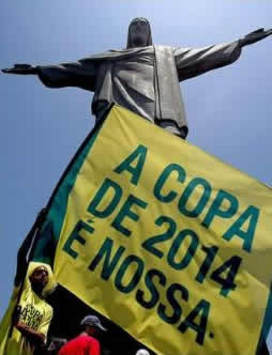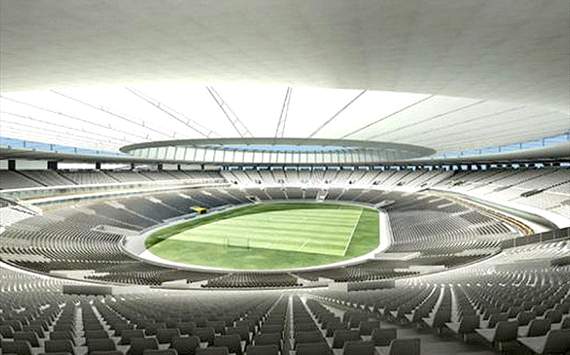Having run unopposed in being awarded the tournament seven years ago, Brazil is only now realising how large a task they face to be ready to host the World Cup

By Keir Radnedge
Nine months ago Fifa president Sepp Blatter declared that Brazil was further behind in its preparations for the World Cup than South Africa had been at the same stage ahead of 2010.
His comment did not go down well. But most impartial observers, both in South America and beyond, recognised that he was telling only the truth. Brazil had been the only candidate to host the 2014 finals . . . and nothing could have been worse.
The greatest threat to a smooth-running World Cup in less than three years’ time is not the pack of assorted scandals and resignations but complacency.
Brazil faces a race against time to be ready in time because, all the way along, the government and its football authorities never had to try – in contrast to the National Olympic Committee which had to fight tooth and nail to secure the summer Games for Rio de Janeiro in 2016.
The Brazilians knew, in 2004, that they were the only contenders. So, in effect, they have already had seven years in which to get their act together.
That is, longer than any other World Cup host in football history.
Brazil was spared serious scrutiny for six years because Fifa and Jerome Valcke, its progress-chasing secretary-general, were engrossed 24/7 in trying to ensure that South Africa ‘worked.’

Big plans for the Maracana | But strike action has hit stadium plans thrice already
While it is a football federation, technically, which ‘wins’ a World Cup, the hard graft of creating both the legal and infrastructural framework is all down to the national government and local authorities.
President Lula da Silva had assured Fifa that all the guarantee boxes concerning cash, tax and tickets would be ticked without question. But Lula’s term of office ended on December 31 last year. Nothing had been signed off and successor Dilma Rousseff was in no way bound by his airy promises.
Allied to that, the elections complication meant the last nine months of Lula’s term of office were accompanied by a total freeze in decision-making.
Only after Rousseff took office and Fifa came knocking urgently on her presidential door did serious negotiations begin over who would pay for the upgrading of all the airports, how the stadia building would be funded and when would a kick-start be applied to the parliamentary process.
Work had already begun on razing and rebuilding the Maracana in Rio but that was to some extent thanks to the Olympics. Maracana will host the 2016 Opening and Closing ceremonies – as well as the World Cup Final – so work was already a commitment from both federal and local governments.
Most of the private finance initiatives for the airports had been put in place though priorities have been set only by this month’s confirmation of the 12 host cities.
At long last Corinthians of Sao Paulo have managed to pull together all the financial and construction strings for work to start on the Itaquerao which will host the Opening Match.
The pace of work is another matter entirely. As with every World Cup, construction workers have discovered the power of the strike weapon – and have deployed it three times on the Maracana project already.
Parliament is proving a hitch, still. The tax waiver was smuggled through, almost unnoticed, but toughening up punishments for commercial pirates and suspending the law enforcing half-price tickets at any major event for pensioners and students - up to the age of 29 – will not be through even the lower chamber of parliament until the new year.
Fifa, for the sake of speed and diplomacy, has had to concede the half-price concession to pensioners while promising a system to guarantee a targeted market for the lowest-price tickets to cover the student rate.
| The 2014 World Cup is past the point of no return. And the Brazilians know it. |  |
Meanwhile the torcida, Brazil’s football fans, seethe at the tales surrounding the ‘sporting oligarchs.’
Orlando Silva, a prime mover in both World Cup and Olympics projects, has been forced put as Sports Minister by allegations – denied – that he embezzled millions of dollars from a youth sports development programme. He is the sixth Minister to quit Rousseff’s government this year alone.
Ricardo Teixeira, the ‘cartola’ [‘top hat’] of Brazilian football, has come under even more personal pressure than usual.
Teixeira is the entrenched president of the Brazilian federation, president of the local World Cup organising authority, one of three South American members of the Fifa executive committee and – most important – the former son-in-law of immensely powerful Joao Havelange: former long-time Fifa president and senior member of the International Olympic Committee.
In the past Teixeira has brushed off one parliamentary investigation after another. But questions about funds for the promotion of a friendly match against Portugal and even about the millions he is alleged to have received from former marketing partner will not go away.
The fraud squad is on his case.
Can Teixeira hang in there, yet again? Will the stadia be ready? Can the airports cope?
Valid questions but all irrelevant: the 2014 World Cup is past the point of no return.
And the Brazilians know it.
Keir Radnedge has covered every World Cup since 1966, analysing the international game for newspapers, magazines, TV and radio around the world
How do you stay up to date with football when on the move? With http://m.goal.com – your best source for mobile coverage of the beautiful game.
 Sphere: Related Content
Sphere: Related Content
![Validate my Atom 1.0 feed [Valid Atom 1.0]](valid-atom.png)
























































Nenhum comentário:
Postar um comentário